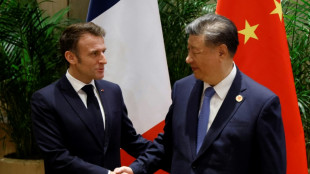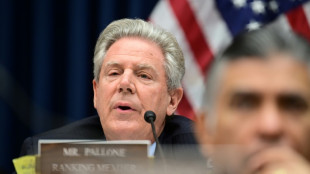
-
 SpaceX set for Starship's next flight -- with Trump watching
SpaceX set for Starship's next flight -- with Trump watching
-
Trump ally seeks to block trans lawmaker from women's restrooms

-
 Slovakia oust Britain to meet Italy in BJK Cup title match
Slovakia oust Britain to meet Italy in BJK Cup title match
-
Top-selling daily French daily Ouest-France stops posting on X

-
 Russian invasion toll on environment $71 billion, Ukraine says
Russian invasion toll on environment $71 billion, Ukraine says
-
'Sabotage' suspected after two Baltic Sea cables cut

-
 'You will die in lies!': daughter clashes with father at French rape trial
'You will die in lies!': daughter clashes with father at French rape trial
-
Spain Women drop veterans Paredes and World Cup kiss victim Hermoso

-
 Stocks diverge on fears of Ukraine-Russia escalation
Stocks diverge on fears of Ukraine-Russia escalation
-
New Botswana leader eyes cannabis, sunshine to lift economy

-
 'Operation Night Watch': Rembrandt classic gets makeover
'Operation Night Watch': Rembrandt classic gets makeover
-
Haiti police, civilians kill 28 gang members: authorities

-
 Taxing the richest: what the G20 decided
Taxing the richest: what the G20 decided
-
'Minecraft' to come to life in UK and US under theme park deal

-
 IMF, Ukraine, reach agreement on $1.1 bn loan disbursement
IMF, Ukraine, reach agreement on $1.1 bn loan disbursement
-
Japan on cusp of World Cup as Son scores in Palestine draw

-
 Chelsea condemn 'hateful' homophobic abuse towards Kerr, Mewis
Chelsea condemn 'hateful' homophobic abuse towards Kerr, Mewis
-
Hamilton to race final three grands prix of Mercedes career

-
 Gatland has not become a 'bad coach' says Springboks' Erasmus
Gatland has not become a 'bad coach' says Springboks' Erasmus
-
Slovakia take Britain to doubles decider in BJK Cup semis

-
 Brazil arrests soldiers over alleged 2022 Lula assassination plot
Brazil arrests soldiers over alleged 2022 Lula assassination plot
-
Ukraine war and climate stalemate loom over G20 summit

-
 Ukraine fires first US long-range missiles into Russia
Ukraine fires first US long-range missiles into Russia
-
Retiring Nadal to play singles for Spain against Netherlands in Davis Cup

-
 Rain ruins Sri Lanka's final ODI against New Zealand
Rain ruins Sri Lanka's final ODI against New Zealand
-
Stocks sink on fears of Ukraine-Russia escalation

-
 Hendrikse brothers start for South Africa against Wales
Hendrikse brothers start for South Africa against Wales
-
Macron tells Xi he shares desire for 'durable peace' in Ukraine

-
 Ruthless Japan beat China to move to brink of World Cup qualification
Ruthless Japan beat China to move to brink of World Cup qualification
-
French farmers threaten 'chaos' over proposed EU-Mercosur deal

-
 Brazil arrests G20 guards over alleged 2022 Lula assassination plot
Brazil arrests G20 guards over alleged 2022 Lula assassination plot
-
China's Xi urges 'strategic' ties in talks with Germany's Scholz

-
 Raducanu gives Britain lead on Slovakia in BJK Cup semis
Raducanu gives Britain lead on Slovakia in BJK Cup semis
-
Russia says Ukraine fired first US-long range missiles

-
 COP29 negotiators strive for deal after G20 'marching orders'
COP29 negotiators strive for deal after G20 'marching orders'
-
Walmart lifts full-year forecast after strong Q3

-
 British farmers protest in London over inheritance tax change
British farmers protest in London over inheritance tax change
-
NATO holds large Arctic exercises in Russia's backyard

-
 Trouble brews in India's Manipur state
Trouble brews in India's Manipur state
-
Son of Norwegian princess arrested on suspicion of rape

-
 Romanian court says 'irregularities' in influencer Andrew Tate's indictment
Romanian court says 'irregularities' in influencer Andrew Tate's indictment
-
Iran faces fresh censure over lack of cooperation at UN nuclear meeting

-
 Despondency and defiance as 45 Hong Kong campaigners jailed
Despondency and defiance as 45 Hong Kong campaigners jailed
-
Scholar, lawmakers and journalist among Hong Kongers jailed

-
 European stocks slide on fears of Russia-Ukraine escalation
European stocks slide on fears of Russia-Ukraine escalation
-
Police break up Georgia vote protest as president mounts court challenge

-
 Spain royals visit flood epicentre after chaotic trip
Spain royals visit flood epicentre after chaotic trip
-
France's Gisele Pelicot says 'macho' society must change attitude on rape

-
 G20 leaders talk climate, wars -- and brace for Trump's return
G20 leaders talk climate, wars -- and brace for Trump's return
-
US lawmaker accuses Azerbaijan in near 'assault' at COP29

| RBGPF | -0.74% | 59.75 | $ | |
| CMSD | -0.08% | 24.37 | $ | |
| RIO | 0.06% | 62.16 | $ | |
| CMSC | -0.06% | 24.61 | $ | |
| BCE | 0.35% | 27.325 | $ | |
| SCS | -0.92% | 13.08 | $ | |
| RYCEF | -2.24% | 6.7 | $ | |
| BCC | -2.44% | 138.17 | $ | |
| BTI | 0.65% | 36.92 | $ | |
| RELX | 0.41% | 45.225 | $ | |
| JRI | 0.11% | 13.245 | $ | |
| VOD | -0.45% | 8.88 | $ | |
| BP | -1.49% | 28.988 | $ | |
| GSK | -0.64% | 33.475 | $ | |
| NGG | 1.01% | 63.54 | $ | |
| AZN | 0.74% | 63.86 | $ |

New Spain opposition chief vows moderation, dialogue
Spain's new opposition leader Alberto Nunez Feijoo pledged to turn the page on confrontational politics and foster inclusive dialogue in his first speech after being overwhelmingly elected head of the Popular Party.
A calm, experienced moderate with a pragmatic outlook, he said he would fight to return the right-wing party to power and warned he would not be a pushover.
"Moderation is not about being lukewarm and dialogue is not submission," he said after being elected leader with 98.3 percent of the votes at a two-day party congress in Seville.
After 13 years governing Galicia in northwestern Spain with an impressive track record of four absolute majorities, the party is hoping the 60-year-old will be able to translate his regional success to a national level.
"Enough of the heated debates and confronting each other, enough of creating problems, there are already so many... Let's end these futile debates and face the real problems," Feijoo told delegates.
"I'm not here to insult (Socialist Prime Minister Pedro Sanchez) but to beat him."
European Commission Vice President Margaritis Schinas, a guest at the congress, said he had full confidence in Feijoo.
"Alberto knows the path to victory very well because if there's one thing he knows about, it's winning elections," he said in fluent Spanish.
The Galician leader was the only candidate running to take over from Pablo Casado, who was edged out following a bitter internal dispute with one of the party's rising stars.
When Casado took over as PP chief in July 2018, he was a young hardliner who promised to breathe new life into a party snarled in corruption and bleeding votes.
But barely four years later, he was left fighting for his political life after a very public confrontation with Isabel Diaz Ayuso, whose success as Madrid regional leader threw his own lacklustre leadership into sharp relief.
In a parting address on Friday, Casado said he was stepping back from politics and giving up his parliamentary seat.
Former PP prime ministers Jose María Aznar (1996-2004) and Mariano Rajoy (2011-2018) also urged the PP to rally around Feijoo.
"His success will mean success for all of us and for Spain," said Aznar, speaking by video link because he has Covid-19.
- Feijoo v. Vox and the Socialists -
Feijoo is the only one of Spain's regional leaders to govern with an absolute majority in a region where the Socialists pose no threat and the far-right Vox has made no headway despite growing popularity across Spain.
But at a national level the situation is the opposite and Feijoo will have to contend with a Socialist-led government, its hard-left partner Podemos and Vox in the ascendency.
During his long political career, Feijoo has steered clear of scandal, despite the emergence of photos from the mid-90s showing his friendship with a cigarette smuggler later jailed for drug trafficking.
While admitting they were friends at the time, Feijoo said he had no idea about the illegal activities.
General elections are due by the end of 2023 but Sanchez's left-wing coalition already looks worn out by the pandemic, soaring inflation and social unrest over spiralling prices as well as the global uncertainty caused by the war in Ukraine.
The far-right has also been a headache for the PP, which has watched how Vox has, within eight years, managed to obtain 52 of the 350 seats in Spain's parliament while its own showing has fallen from 186 to 88.
Even if the PP does succeed in next year's election, recent polls suggest it could need the support of Vox to govern.
Alarm bells sounded last month when the PP made a coalition deal with Vox, letting the far-right faction into a regional government for the first time, raising fears it could be a blueprint for future power-sharing, both regionally and nationally.
R.Garcia--AT
